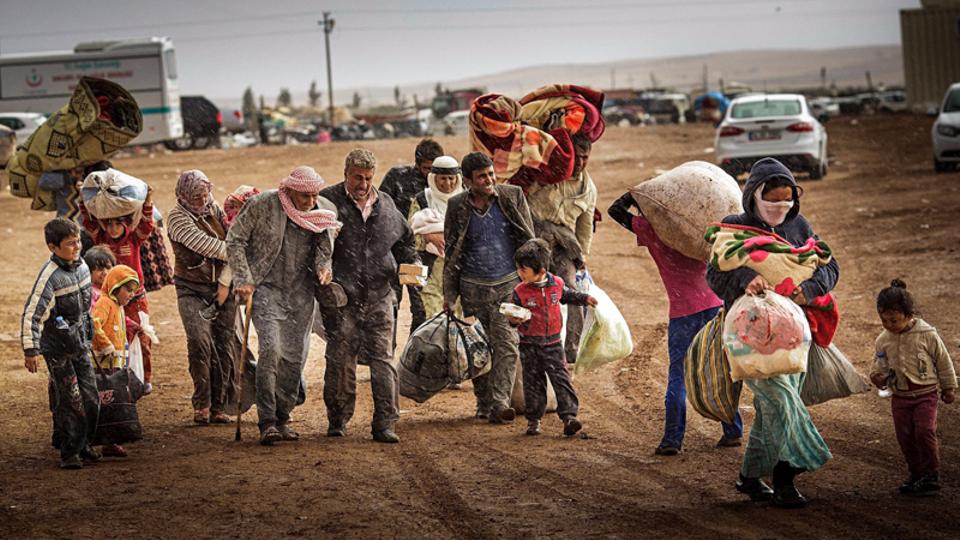Tens of thousands of Syrians, in areas recaptured by government troops this year, remain starved of humanitarian aid, with the relief agencies that have helped them for years, now unable to reach them.
As towns switched from opposition to government control, international aid groups have been forced to halt their crucial health, food and protection services as they have no government authorization to work.
Since April this has left vulnerable civilians in Syria's south, eastern Ghouta near Damascus, and rural parts of Homs province without the vital support they once relied on.
"In total, tens of thousands of people are impacted by the halt in humanitarian aid," said Joelle Bassoul, spokeswoman for CARE International, which used to send aid into rebel-held areas.
"In effect, when we stop operating, it means our partners have stopped operating and have no more humanitarian capacity in the given area."
More than seven years into Syria's conflict, 13 million people across the country still need humanitarian assistance, says the United Nations.
Aid became politicized early on, and two separate operations developed.
One, based out of Damascus, saw the UN and other agencies providing assistance solely with government authorization.
Meanwhile, NGOs based in Turkey or Jordan helped civilians in rebel areas through a parallel system, without regime approval.
This year President Bashar al-Assad brought many of those areas under government control through a string of military victories, forcing those international agencies to pull out.
Clinics Close
"The aid that used to come to the south from international agencies, has completely stopped," said Mohammad al-Zoabi, 29, from al-Mseifra in southern Syria.
"Now, there's a lack of flour, medical supplies, and hospitals in general after medical points and field clinics were closed, badly affecting people," he said.
According to the UN, 66 aid trucks entered the south from Jordan in June but zero in July when troops seized the area.
Southern residents interviewed by AFP reported hospital closures and a lack of medicine and flour.
They said the doctors and Syrian aid workers who had fled, were wanted by security forces for working in rebel areas or had requested — but were denied — regime permission to resume relief work.
The International Rescue Committee (IRC), Mercy Corps, and Save the Children all confirmed they had halted aid programmes.
"During the course of the war, as areas have changed hands to government control, the IRC has stopped providing support in those areas," IRC country director Lorraine Bramwell told AFP.
The IRC said it reached more than 300,000 people in Syria's south last year and backed six clinics in eastern Ghouta.
The army recaptured Ghouta in April after an offensive that killed 1,700 civilians.
Government forces then seized areas around Damascus including the Yarmouk Palestinian camp from hardliners and the Islamic State.
Jafra, a local foundation helping Syrian Palestinians, said one hospital and one school they backed in those areas had to close, pending government permission to reopen.
But residents remain in dire situations, said the head of Jafra, Wesam Sebaaneh.
"These people are the same. The needs are the same… actually they've gotten worse," he said.
‘Constrained' Access
Residents in Talbisseh, a town in Homs seized by the government in May, said medicine and food have become unavailable or unaffordable.
"There was one functioning hospital and three medical points in Talbisseh before the regime came, but they’ve all shut down because now they need licenses from the ministries," said Sami, 20.
Areas brought back under regime control are able to access state-provided services and receive aid from the Syrian Arab Red Crescent, the main state-approved conduit for aid.
But residents said government hospitals were often too far away while the aid from the Red Crescent did not match the assistance they received from international NGOs.
Others said they feared interfacing with regime services in case they suffered retribution for years living under rebel control.
“The changes in control that have been witnessed means that humanitarian access continues to be constrained," the UN said in August.
"This prevents a timely response to humanitarian needs, that for the most part, remain acute following the burden of living under siege for a protracted period."
International NGOs still work in Syria's Kurdish-controlled northeast and in Idleb, the last major rebel bastion in the northwest.
And some may plan to seek government permission to work in Damascus.
Mercy Corps has already applied, said country director Arnaud Quemin, but he insisted the breadth and scope of cross-border operations would not easily be replaced.
"The question I ask myself today is: are we going to see access improvements in the coming months, now that the government is not under any existential threat anymore, and the war is militarily mostly won?”
This article was edited by The Syrian Observer. Responsibility for the information and views set out in this article lies entirely with the author.


